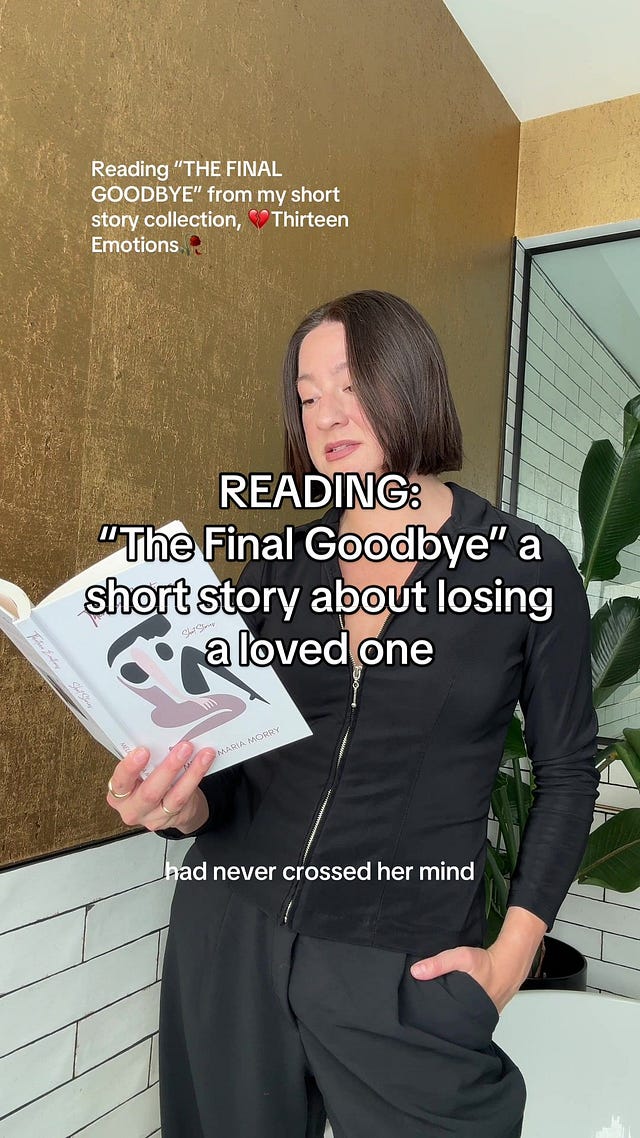How Grief Changes Your Brain When You Lose Someone You Love
Plus an excerpt from my short story, The Final Goodbye, from my collection Thirteen Emotions—available on Amazon now!
Recently, I was chatting with my husband about grief. My grief in particular. I told him that every time someone I love dies, a piece of me goes with them. I’m not whole anymore and I’m not the same person I was before all of the loss. He had a difficult time understanding. Fortunately for him, he’s never experienced immediate grief or loss. The people he loves are still thriving. He’s lucky for that.
In the last ten years, I have lost my dad, my great-grandma, my grammy, my mom, and my childhood dog. It feels as though as soon as I barely come to terms with my loss, I lose someone else. (I told my Grampa that I can’t handle any more loss for at least a decade and he said he’d already made that pact. Which, is totally unfair, I know, but it still felt comforting.)
I know that my story isn’t unique. People suffer losses way worse than mine every single day. But damn, it still sucks. And I’ve found that grief not only pertains to people we have lost, but to dreams as well. Or goals. All of these losses shape you. They’ve shaped me into someone I, at times, don’t recognize. For example, I’ve always been a bubbly, social butterfly kinda girl, but some days I feel more like flat champagne. And no one wants to drink flat champagne. Gross.
Then, I came across an interesting post talking about how grief changes your brain. Literally.
Grief is a complex emotion that can, in fact, deeply impact your brain. (So I’m not insane for thinking I’m different now than I was then.) When someone experiences loss, especially the death of a loved one, the brain undergoes significant changes. Studies have shown that grief can affect the brain’s functioning, leading to difficulties in concentration, memory, decision-making, and emotional regulation.
The stress associated with grief can also trigger the release of cortisol, known as the stress hormone, which can have long-term effects on the brain. Over time, grief can reshape neural pathways, potentially leading to symptoms of anxiety, depression, and even post-traumatic stress disorder. Isn’t that unbelievable yet totally believable?
There was a time after my dad died where I couldn’t look at pancakes without bursting into tears because they were something he made every Sunday for breakfast. I remember sobbing onto a piping-hot griddle because I couldn’t believe I was keeping alive this weekend tradition while he didn’t get to. Tears sizzling and batter bubbling.
It’s essential to recognize the profound effects of grief on the brain and seek support to navigate this challenging emotional process. Grief is different for everyone, but one thing that I think remains consistent throughout any experience is the helplessness you can feel. You’re not alone.
Read on for an excerpt from my short story The Final Goodbye, inspired by the night I lost my dad. It’s in my fiction collection Thirteen Emotions and is currently available on Amazon and through my website.
Thirteen Emotions tackles many different emotions, obviously. However, I’d say that grief has somehow weaved its way into more than one. Whether it’s the loss of a loved one, the dissolution of a marriage, the inability to create new life, the scars left by previous generations—we can feel grief in many different ways and in many different scenarios.

 Tiktok failed to load.
Tiktok failed to load.Enable 3rd party cookies or use another browser
The Final Goodbye
She stayed with her father while they admitted him, holding his hand, something she hadn’t done since she was a little girl, and reassuring him as much as herself that things would be fine. Of course everything would be. They could even have dessert when they got back to the house, if he wanted. There was cake on the counter.
“Any pre-existing illnesses we should know about?” one of the nurses asked, pen clicking along a chipped clipboard.
“No,” replied her father.
“He has brain cancer,” she corrected.
Did he forget? To her, it felt inconceivable. Then again, her brain was fine. Had his cancer spread? Was it worse than his doctor had thought at the last check-up? Glioblastoma wasn’t like losing your keys. Although he’d lost far more than that in the last six months: his home, his job, his independence.
He was rolled away and now she waited in the claustrophobic lobby that provided little comfort—in both the physical and emotional sense. The clock on the wall seemed to mock her with each passing second. Tick, tock, tick, tock. First ten minutes lumbered by, then twenty, thirty. What was taking so long? Where was he? Why had no one updated her? Her crossed leg trembled, in a panic, as if she were subconsciously trying to run as far away from the hospital and its sickly staleness as she possibly could.
Her sweater itched and she thought, in hindsight, she should’ve chosen a softer one. Or worn a long-sleeve underneath. Inconsequential things, in the weight of her current situation, but things that momentarily let her mind fret about something other than her father’s aggressive tumor.
Help out a self-published indie author and buy a copy of Thirteen Emotions through my website.





